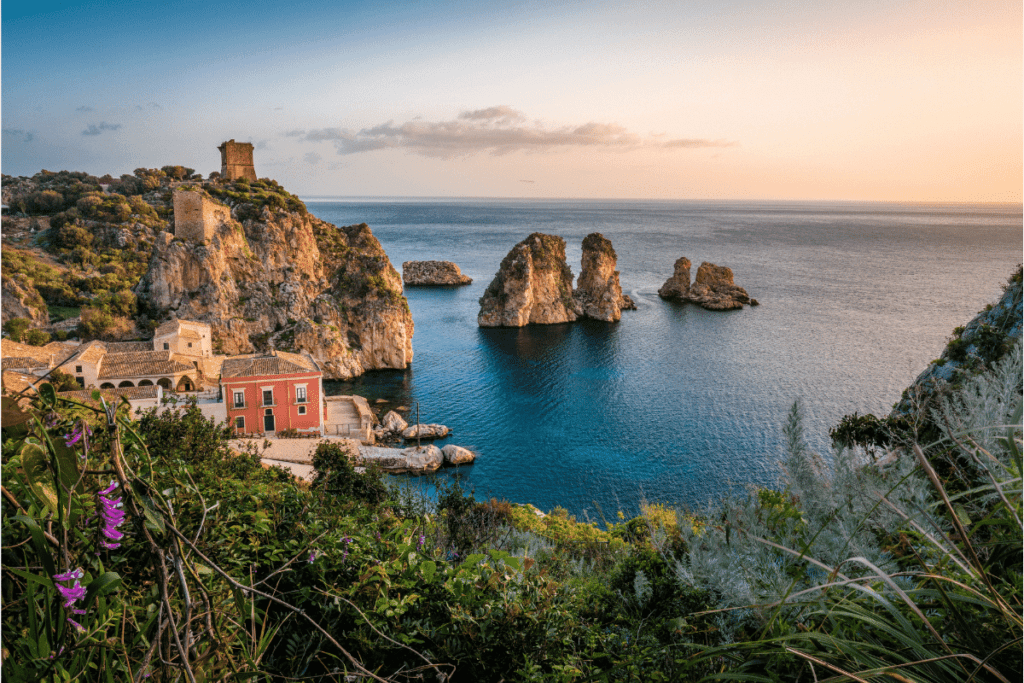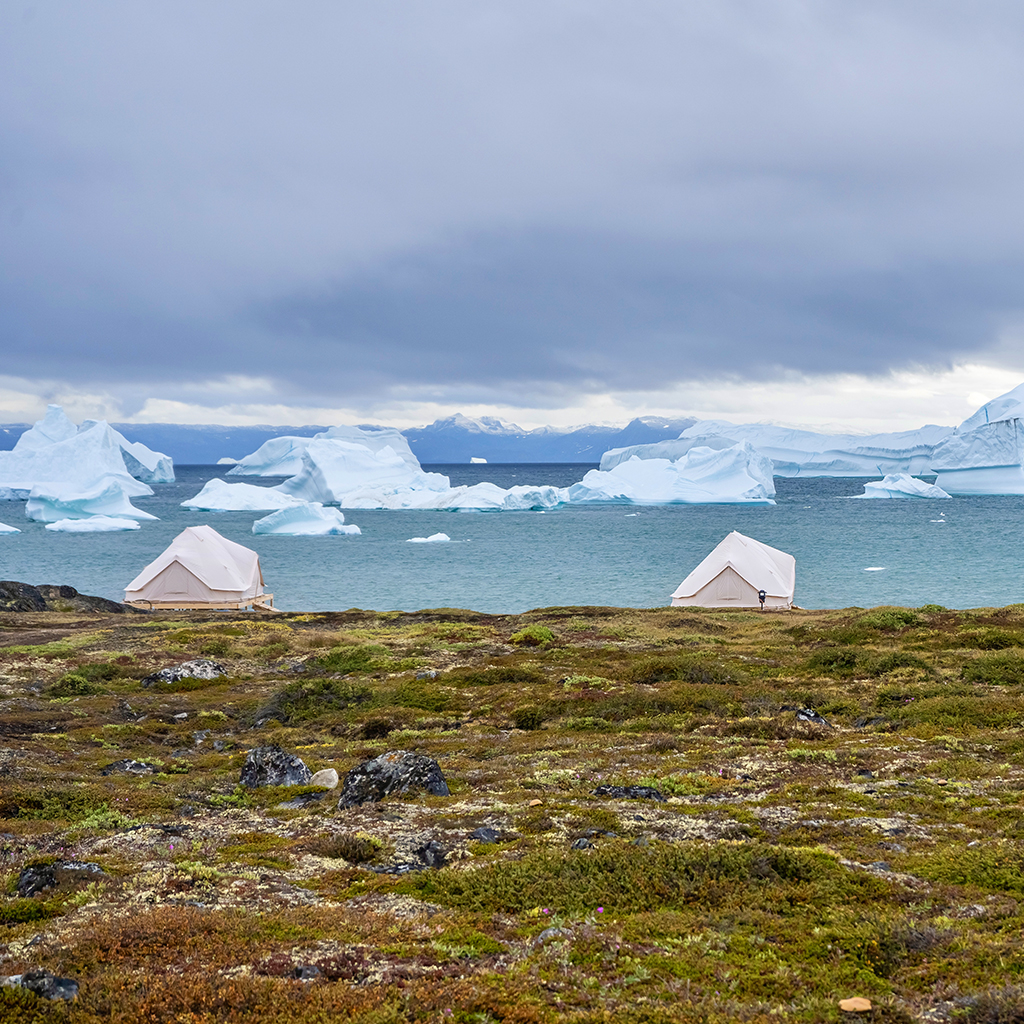
If you’re heading to Italy, you might think learning Italian is the only language you’ll need. And while Italian will help you galavant around most of the country, once you get to Sicily, you’ll be met with an entirely different language: Sicilian. That’s right folks, Sicilian is a language, not a dialect. If you want to impress the locals and engage in Sicilian culture, you’ll want to learn some of it. Keep reading for some survival Sicilian, and our favorite fun (and funny) Sicilian phrases.
Why Visit Sicily?
Home to charming villages, Europe’s largest active volcano, and some of the best-preserved archeological sites filled with Greek and Roman temples, structures, and art—Sicily is a Mediterranean gem and belongs on your bucket list.
If the promise of sun-kissed mornings, mouth-watering cuisine with unique local influences, and seaside villages aren’t enough to convince you, the promise of Sicilian wine will. Did we mention you can drink wine made from grapes grown on volcanic soil?
A Little Bit About Sicilian
Sicilian is a Romance language spoken in the Sicilian region of Italy. It’s not a dialect of Italia. In fact, Sicily has its own dialects, including Western Sicilian, Central Sicilian, and Eastern Sicilian.
Around 5 million people speak Sicilian locally and another estimated 2 million speak it around the world. Since the 1990s, when Italy began enforcing the use of Italian in public schools, Italian has started competing with the local language. The Sicilians of today might learn Italian before they learn Sicilian, but Sicilian is still widely spoken in the region. Ready to learn some? Se!
Everyday Survival Phrases in Sicilian
Hello
Good evening
Good night
See you later
How are you?
Thank you
Yes
No
Salutamu
Bonasira
Bonanotti
Ni videmu
Comu si?
Grazij
Se
No
(Pronounced sah-loo-TAH-moo)
(Pronounced boh-nah-SEE-rah)
(Pronounced boh-nah-NOT-tee)
(Pronounced nee vee-DAY-moo)
(Pronounced como-si)
(Pronounced grat-zi)
(Pronounced se)
(Pronounced no)
Eight Fun Phrases in Sicilian
One of our favorite things to do on our blog is finding the most interesting, absurd, and fun local phrases in a language. Here are our picks for Sicilian!
1. Si Liccanu La Sarda: “They Lick the Sardine”
It’s one thing to go fishing, catch a fish, and eat it for dinner. It’s another thing to kill a fish, just because you want to lick it. (What?) This odd saying in Sicilian refers to someone who is so cruel that they don’t even eat the fish they kill, they just lick it! What a waste…
When to use it: You’re gossiping with your new Sicilian friend about your arch-nemesis back home. There’s only one way to describe them. Si liccanu la sarda…
2. Acqua Davanti e Ventu D’arreri: “Water In Front and Wind Behind”
In a similar vein as the previous phrase, this one’s for someone you… just don’t like very much. In particular, it’s for someone who you had sympathy for at first, but let’s just say they did something to shift the tide. Now, you want them to suffer. It means that you hope they get lost in the rain (water in front) and get pushed as far away from you as possible (wind behind).
When to use it: You know your arch-nemesis, the one who licks the sardine? You might use this phrase on them.
3. Mangiarono Con La Salvietta: “They Ate With Napkins”
This phrase is used to express genuine satisfaction. The idea being, (we’re guessing here) that when you use a napkin, you like, really enjoyed your meal. (Picture us getting pasta con le sarde all over ourselves because it was just that good).
When to use it: When you are truly satisfied with something, be it a meal or something else entirely.
4. Mastru Cola, Cu ‘Na Furma: No Direct Translation!
Lots of Sicilian words and phrases don’t have direct translations in English. TBH, that’s what makes the language so cool. It’s like, you have to speak Sicilian in order to tap into certain ways of thinking or cultural ideas. This one is about Mastro Cola, a shoemaker who made slippers in a specific and perhaps peculiar manner. He didn’t care what other people thought about his slipper-making, and neither should you.
When to use it: To describe someone who does what they like, regardless of what others think about it.
5. Non Ni Manciu Chiacchiri: “I Don’t Eat Gossip”
During the four-day-long Carnevale in Sicily, you’ll find people eating chiacchiere, a delicious fried dough cooked in liquor. As you can imagine, Carnevale—and chiacchiere eating—leads to gossip. And this Sicilian phrase is about not believing baseless gossip or lies.
When to use it: An acquaintance tries to convince you that now is a good time to sell your home because they claim the housing market is about to take a hit. Uh, did you even ask?
6. Quaquaraqua: “Blabbermouth”
Sometimes when people talk, it starts to come out like “blah, blah, blah.” That’s a good sign that they’re, um, talking too much and should try listening for a change. That’s where this phrase comes in handy.
When to use it: Your friend wants to invite one of their other friends to your going away party. You say, “Oh God no. I don’t want that quaquaraqua at my house again.”
7. Focu ‘Ranni: “Big Fire”
So, you’re in a bit of a pickle. Only, you’re in Sicily, so you’re in a… big fire. It’s one of those situations that’s complex, annoying, or even possibly life-altering.
When to use it: A kind stranger asks you how you’ve been, and suddenly you feel like telling them the truth. Rather than a simple, “I’m fine,” you say, “Focu ‘ranni… focu ‘ranni.”
8. Va Eccati: “Go Throw Yourself [In the Sea]”
Okay, a lot of these phrases have been a little mean, but bear with us. This one’s a supreme insult that you save for someone you really don’t like or don’t want to see.
When to use it: You’re on your Sicilian vacation and receive a dm from your ex. What the hell? They say something along the lines of, “You’re in Sicily? So am I! We should get an espresso.” Your reply? Two words: “Va. Eccati.”
Practice Your Sicilian With The Travel Yogi
If you want to do Sicily right, we recommend signing up for our newest Travel Yogi Adventure to Sicily. We’ll guide you through panoramic views of the Sicilian countryside, all while sipping wine made on volcanic soil. You’ll experience classic Renaissance and Baroque architecture on Ortigia, a UNESCO World Heritage Site, and learn how to make focaccia (and ancient chocolate) from the pros.
And if you’re just here for the languages, learn our favorites phrases in Croatian, Icelandic, and Spanish next.

